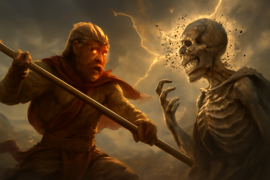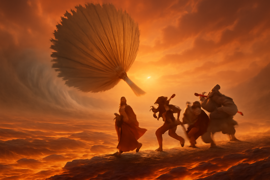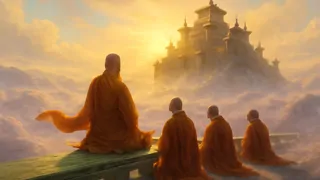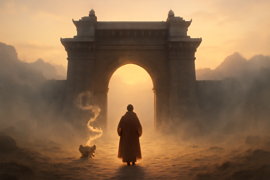Introduction
Under the crimson banners that fluttered above Chang’an’s mighty walls, the monk Xuanzang stood silent amid the dawn bustle of horses, porters, and court officials. He was slight of frame, yet the calm resolve in his eyes made him seem taller than the armored guards who watched him kneel for a final blessing. For months he had petitioned the emperor for leave to travel westward in search of the true Sanskrit sutras. The empire feared the deserts, brigands, and foreign kingdoms that lay beyond the Jade Gates, but Xuanzang feared only that his people might mistake echoes for truth if he did not bring the purest teachings home. The emperor, moved by such devotion, bestowed a silk-embroidered passport and a simple horse. Thus, at a sunrise flushed with rose-gold light, the monk slipped out through Yumen Pass, knowing he would not return until he had crossed the spine of the world. In the hush beyond the frontier he felt the world deepen: dunes breathing like sleepy dragons, distant snow peaks flashing silver, and the unending wind that seemed to chant sutras of its own. Yet even this vastness could not foretell the companions—divine, profane, and monstrous—who would soon reshape his lonely pilgrimage into a saga sung for a thousand years.
The Stone Monkey’s Vow
The Gobi’s scorched breath had barely cooled on Xuanzang’s robe when destiny thrust an unlikely guardian into his path. Deep within Flower-Fruit Mountain, a playful chaos boiled: Sun Wukong, the Stone Monkey, had broken free from five centuries of imprisonment beneath the Five-Elements Peak. Forged from the world’s primal quartz and schooled in heaven’s courts before his rebellious uprising, the Monkey King possessed eyes that could pierce illusion and a staff that could shatter continents. Yet his boundless strength had curdled into restless loneliness during the years of immobility. When Guanyin the Merciful told him of a pilgrim whose purity might redeem even the wildest heart, Sun Wukong leapt cloud to cloud to kneel before Xuanzang.

At first the monk trembled. This creature’s golden fur bristled with mischief; his grin promised trouble. Still, Xuanzang’s vow encompassed all beings, and the Bodhisattva’s endorsement could not be ignored. With a prayer murmured against the wind, he accepted the Monkey King as disciple—but not without safeguard. Guanyin slipped a wreath of gleaming filigree onto Wukong’s brow, instructing Xuanzang in a tightening spell to quell the simian’s temper. The very notion of constraint made the Monkey King’s fur stand on end, but in the same breath he felt the cool water of purpose pour over his fiery spirit. Swearing on mountain and sky, he promised to shield Xuanzang from every fang and spear between Chang’an and Thunder-clap Monastery.
Their first test arrived within days: the White-Bone Demoness, disguised first as a village girl, then a mourning mother, and finally a venerable elder, each guise meant to lure the compassionate monk. But Wukong’s Fiery Golden Eyes unmasked her rotten qi. Three times he struck, and three times Xuanzang, deceived by the demon’s pitiable illusions, chastised him bitterly. Only when the sky churned black and the demoness revealed her skeletal form did the monk grasp the peril he had narrowly escaped. Though ashamed of his doubt, Xuanzang’s remorse softened the Monkey King’s simmering pride, forging a bond tempered by humility on one side and obedience—however reluctant—on the other. Together they pressed westward, the sun wheeling overhead like a bronze gong, heralding challenges that would dwarf even demons of bone.
Crossing Fire and River
Beyond the westernmost caravan routes, the Flaming Mountains writhed like molten serpents. Daylight there was a bellows: every gust drew fresh flames from red shale cliffs, while currents of blistering air warped the horizon. No mortal dared linger—yet somewhere past the inferno, the Silk Road resumed. Searching for passage, Xuanzang encountered Princess Iron-Fan, mistress of a palm-leaf fan large enough to summon monsoons. Her husband, Bull Demon King, coveted immortality and resented heaven’s mandates; he forbade her from aiding the monk. Diplomacy failed, and Sun Wukong resorted to subterfuge. Borrowing shape from a fly’s body, he slipped into the palace wine, tumbled down Iron-Fan’s throat, and wrought such havoc within that she surrendered the fan in retching desperation.

Still the path was brutal. Three swings of the enchanted leaf quelled only a corridor through the firestorm; lava rivers hissed on either side. It was then that Zhu Bajie, once Marshal of Heaven but now condemned to a pig-spirit’s form for gluttony and lust, lumbered from his burrow seeking penance. With his nine-toothed rake he widened the path, pushing aside searing boulders while grumbling about missed meals. Xuanzang saw beneath the hog-face a heart bruised by shame; he offered Bajie the discipline of pilgrimage as a cure. The pig-spirit, dreaming more of donation feasts than enlightenment, accepted anyway, and so the company numbered three.
No sooner had they cleared the inferno than they reached the River of Flowing Sands, where silt swallowed travelers like quicksilver. Here dwelled Sha Wujing, the Sand Monk, once a celestial general who shattered a crystal goblet and fell two thousand leagues as punishment. Time had eroded his fury into silence, but the hunger of the river spirits kept him cruelly vigilant. Only Xuanzang’s chant of compassion pierced the gloom. Sha, moved by that steady light, used his necklace of skulls to ferry his future master across the current. With the addition of his stoic strength, the pilgrimage acquired balance: Monkey’s daring, Pig’s appetite, Sand’s patience, and the monk’s steadfast faith—each counterweighing the others like pillars of a pagoda.
These bonds were tested nightly by demons who believed a single bite of Xuanzang’s sanctified flesh would grant immortality. The Yellow-Robe Fiend forged illusions of paradise; the Scorpion Demon struck with a tail that pierced metal; even the indolent Bajie nearly betrayed the party for a silk-draped enchantress offering endless banquets. Yet dawn after dawn the travelers emerged, battered but unbroken, their quarrels dissolved in shared sutras recited under fading stars. Around their campfires, Monkey’s laughter clashed against Pig’s complaints, while Sand silently stoked the flames. Xuanzang listened, mapping in their voices the cosmic truth he sought: that enlightenment is no solitary summit but a range of peaks climbed together, each climber hauling the other upward when legs falter.
Thunder-clap Enlightenment
After fourteen years and a million heartbreaks, the travelers reached the borders of Vulture Peak, where the air rang like bronze cymbals struck by unseen hands. A final gauntlet remained: nine-headed insects, mountain ogres, and a kingdom whose inhabitants were cursed to wear masks of their own fears. Each obstacle mirrored the pilgrims’ private demons—Monkey’s arrogance, Pig’s craving, Sand’s lingering guilt, Xuanzang’s temptation to despair. They prevailed not by force alone but by surrendering the illusions that fed those demons. At last they stood before Thunder-clap Monastery, a palace of luminous tiers floating upon clouds dyed violet by perpetual dawn.

The Tathāgata awaited, serenity radiating from every pore. Before him lay a sea of blank parchment scrolls. When Xuanzang bowed for the scriptures, thunder rolled like distant drums. The Buddha smiled: “These sutras are empty to eyes that still cling. Only those who carry experience in their marrow can ink meaning onto silence.” He passed Xuanzang a stack of scrolls stamped plain red. The monk’s heart quaked—had the hardship been for nothing? Yet as tears touched the parchment, words blossomed in gold, each phrase reflecting a trial they had mastered on the road: patience against flame, resolve against hunger, mercy against hate. The scriptures were living mirrors, readable only to souls tempered by journey.
Reward followed revelation. Monkey shed the circlet, ascending to Buddha Victorious in Strife. Pig was appointed Cleanser of the Altars, his appetite turned to humble service. Sand became Golden-bodied Arhat, guardian of pilgrims yet to come. Xuanzang, now Tripiṭaka Buddha, was offered everlasting repose in the Western Paradise. He declined. His vow bound him still to the Middle Kingdom, where ignorance bloomed afresh each generation. Taking leave of the thunderous skies, he led his disciples eastward once more, scrolls secured, missions renewed.
Legend records the moment Chang’an’s people saw their monk return: bells tolled of their own accord, lotus petals drifted from a cloudless sky, and children heard, beneath ordinary street noise, the echo of distant chanting. In palace and hovel alike, hearts stirred with a hunger that was not for food but for meaning. Xuanzang knew then that the true journey to the West was never about crossing deserts or battling demons; it was—and is—about carrying the flame of insight back to the darkest places within ourselves, again and again, until every mind is a monastery where thunder speaks of compassion.
Conclusion
The chronicles say that Xuanzang spent the rest of his years translating the radiant scrolls into the language of his homeland, his quill moving like a prayer answered stroke by stroke. Sun Wukong, now a warrior-saint, guarded mountain passes where bandits once prowled. Zhu Bajie fed the poor at wayside temples, offering laughter along with rice. Sha Wujing taught silence to novices who mistook stillness for emptiness. Yet their greatest legacy lay not in deeds engraved on stone but in footsteps pressed into desert and forest, showing where impossible roads might yet be walked. For every seeker who lifts weary eyes to a horizon of fire or flood, there is comfort in knowing that four unlikely companions once passed that way—and returned with proof that perseverance can coax scripture from blankness, that compassion can tame chaos, and that the West we chase is, finally, the awakening of the heart.



















